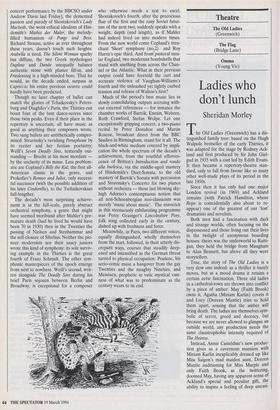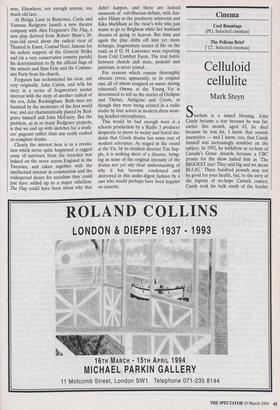Theatre
The Old Ladies (Greenwich) The Flag (Bridge Lane) Omma (Young Vic)
Ladies who don't lunch
Sheridan Morley
The Old Ladies (Greenwich) has a dis- tinguished family tree: based on the Hugh Walpole bestseller of the early Thirties, it was adapted for the stage by Rodney Ack- land and first produced by Sir John Giel- gud in 1935 with a cast led by Edith Evans. It then became a repertory-theatre stan- dard, only to fall from favour like so many other well-made plays of its period in the late 1950s.
Since then it has only had one major London revival (in 1969) and Ackland remains (with Patrick Hamilton, whose Rope is coincidentally also about to re- appear) one of the greatest of our 'lost' dramatists and novelists.
Both men had a fascination with dark and strange worlds, often focusing on the dispossessed and those living out their lives in the twilight of anonymous boarding houses: theirs was the underworld to Ratti- gan, they held the bridge from Maugham to Alan Bennett, but above all they were storytellers.
True, the story of The Old Ladies is a very slow one indeed: as a thriller it barely moves, but as a mood drama it retains a certain eerie fascination. Three old ladies in a cathedral-town are thrown into conflict by a piece of amber: May (Faith Brook) owns it, Agatha (Miriam Karlin) covets it and Lucy (Doreen Mantle) tries to hold them apart, sensing that the amber will bring death. The ladies are themselves sym- bolic of terror, greed and decency, but because we are never allowed to glimpse an outside world, any production needs the same claustrophobic intensity required of The Heiress.
Instead, Annie Casteldine's new produc- tion gives us a cavernous mansion with Miriam Karlin inexplicably dressed up like Miss Saigon's mad maiden aunt, Doreen Mantle auditioning for Miss Marple and only Faith Brook, as the twittering, doomed May, having any apparent sense of Ackland's special and peculiar gift, the ability to inspire a feeling of deep uneasi- ness. Elsewhere, not enough arsenic, too much old lace.
At Bridge Lane in Battersea, Corin and Vanessa Redgrave launch a new theatre company with Alex Ferguson's The Flag, a new play derived from Robert Shaw's 20- year-old novel about the radical vicar of Thaxted in Essex, Conrad Noel, famous for his ardent support of the General Strike and (in a very conservative country parish) his determination to fly the official flags of the miners and Sinn Fein and the Commu- nist Party from his church. Ferguson has rechristened his vicar, not very originally, John Calvin, and tells his story in a series of fragmentary scenes intercut with the story of another radical of the era, John Rockingham. Both men are haunted by the memories of the first world war, and are charismatically played by Red- grave himself and John McEnery. But the problem, as in so many Redgrave projects, is that we end up with sketches for a work- ers' pageant rather than any really crafted or complete drama. Clearly the interest here is in a revolu- tion which never quite happened: a ragged army of survivors from the trenches was indeed on the move across England in the Twenties, and taken together with the intellectual interest in communism and the widespread desire for socialism they could just have added up to a major rebellion. The Flag could have been about why that didn't happen, and there are indeed moments of sub-Shavian debate, with Jen- nifer Hilary as the predatory aristocrat and Kika Markham as the vicar's wife who just wants to go to Brighton while her husband dreams of going to heaven. But time and again the play drifts off into yet more lethargic, fragmentary scenes of life on the road, as if D. H. Lawrence were reporting from Cold Comfort Farm. The real battle between church and state, peasant and patrician, is never joined.
For reasons which remain thoroughly obscure (even, apparently, to its original cast, all of whom resigned en masse during rehearsal) Omma at the Young Vic is determined to tell us the stories of Oedipus and Thebes, Antigone and Creon, as though they were being related in a radio studio by four actors in modern dress wear- ing headset-microphones.
This would be bad enough were it a schools production by a Radio 3 producer desperate to prove to weary and bored stu- dents that Greek drama has some sort of modern relevance. As staged in the round at the Vic, by its resident director Tim Sup- ple, it is nothing short of a disaster, bring- ing us none of the original intensity of the drama nor yet any clear understanding of why it has become condensed and destroyed in this audio-digest fashion by a cast who would perhaps have been happier on cassette.



























































 Previous page
Previous page